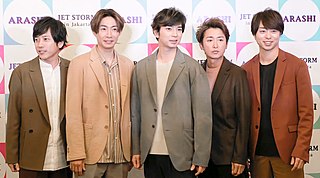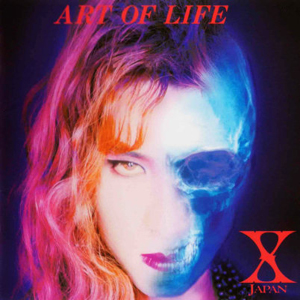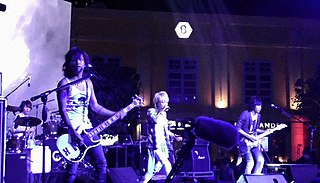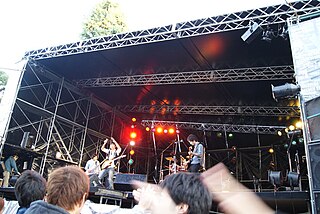
L'Arc-en-Ciel, stylized as L'Arc〜en〜Ciel and abbreviated as Laruku, is a Japanese rock band formed in Osaka in 1991 by bassist Tetsuya and vocalist Hyde. Following the departure of original members Hiro and Pero, guitarist Ken and drummer Sakura were recruited to replace them in 1992 and 1993, respectively. While they first got their start as a visual kei band, L'Arc-en-Ciel have not had any association with the movement since their major label debut in 1994. Sakura left the band in 1997 and was replaced by Yukihiro in January 1998, completing the current line-up.

Mai Kuraki is a Japanese pop and R&B singer, songwriter and record producer. After releasing her US debut single "Baby I Like" in 1999, Kuraki signed with Giza Studio and released her Japanese debut single "Love, Day After Tomorrow" in 1999. In 2000, she released her debut album, Delicious Way, which debuted at number-one and sold over 2.2 million copies in its first week. The album has spawned four top-three singles, "Love, Day After Tomorrow", "Stay by My Side", "Secret of My Heart", and "Never Gonna Give You Up". Eventually, the album sold over 3.5 million copies nationwide and became the best-selling album in Japan in 2000, and has been the ninth best-selling album in Japan of all-time.

Arashi is a Japanese boy band consisting of five members formed under the Johnny & Associates talent agency. The members are Satoshi Ohno, Sho Sakurai, Masaki Aiba, Kazunari Ninomiya, and Jun Matsumoto. Arashi officially formed on September 15, 1999, in Honolulu, Hawaii, and made their debut CD on November 3, 1999. The group was initially signed to Pony Canyon and released one studio album and six singles—beginning with their 1999 eponymous debut single before moving to the Johnny's subsidiary label J Storm in 2001, which was initially set up for their succeeding releases. While their debut single sold close to a million copies, the group took a mixture of pop and alternate/contemporary approach to its music which attracted core followers, but subsequently faced commercially slow sales.

SMAP was a Japanese boy band, composed of Masahiro Nakai, Takuya Kimura, Goro Inagaki, Tsuyoshi Kusanagi, and Shingo Katori. The group was created in 1988 by music producer Johnny Kitagawa, founder of Johnny & Associates, originally as a six-piece with Katsuyuki Mori, until his departure from the band in 1996. The name stands for "Sports Music Assemble People". After making their debut in 1991, the group took the Japanese entertainment industry by storm, becoming one of the most successful boy bands in Asia. The group is often referred to as a "national treasure" and a "fortune and property of the country" in Japan.
Zard were a Japanese pop rock group, originally with five members, with lead vocalist Izumi Sakai as its only constant member. Izumi Sakai was also the band's core member. Zard's work was sold under the record label B-Gram Records, Inc. Their most popular and successful songs are "Makenaide" (1993) (負けないで), "Yureru Omoi" (1993) (揺れる想い), and "My Friend" (1996). As of 2023, Zard has sold over 38 million records, making them one of the best-selling music artists in Japan.

Chihiro Onitsuka is a Japanese singer-songwriter.
Orange Range are a Japanese rock band known for their strong Okinawan identity. Formed in 2001, the band began with Spice Music and later signed with Sony Music Japan's gr8! records division in 2003. The band left gr8! records in 2010 to start their own label, Super Echo. In 2012, they signed with Victor Entertainment's Speedstar Records label.
Buck-Tick is a Japanese rock band formed in Fujioka, Gunma in 1983. The group consisted of lead vocalist Atsushi Sakurai, lead guitarist Hisashi Imai, rhythm guitarist Hidehiko Hoshino, bassist Yutaka Higuchi and drummer Toll Yagami from 1985 until Sakurai's death in 2023. The band has experimented with many different genres of music throughout their four decade career, including punk rock, gothic rock and industrial rock. Buck-Tick are commonly credited as one of the main founders of the visual kei movement.
NEWS is a Japanese boy band consisting of Keiichiro Koyama, Takahisa Masuda and Shigeaki Kato. Formed in 2003 by Johnny Kitagawa as a nine-member group under the label Johnny's Entertainment, NEWS released a promotional single "NEWS Nippon", which was used for the World Cup of Volleyball Championships. In 2004, Takahiro Moriuchi left the group and the remaining eight members released their debut single, "Kibō: Yell", which debuted atop the Oricon charts.
Noriko Kamachi, known professionally as Seiko Matsuda, is a Japanese singer-songwriter, known for being one of the most popular Japanese idols of the 1980s. Since then, she has continued to release new singles and albums, go on annual summer concert tours, perform at winter dinner shows, in high-profile TV commercials and movies, and make frequent appearances on TV and radio. Her alma matter is Chuo University.

Onyanko Club was a large all-girl Japanese pop idol group in the 1980s. Some members of the group participated in spin-off groups, such as Nyangilas, Ushiroyubi Sasaregumi and Ushirogami Hikaretai. Many of the latter two groups' songs were used as theme songs of the popular 80s anime series High School! Kimengumi and Tsuide ni Tonchinkan. Several big-name idols stemmed from the group; one of the best known being Shizuka Kudo. The group was produced by Hiroshi Ishida and Kazuji Kasai, both of whom were producers of Fuji TV's show Yūyake Nyan Nyan.

Art of Life is the fourth studio album by Japanese heavy metal band X Japan, released on August 25, 1993, by Atlantic Records. The album consists solely of the 29-minute-long orchestrated title track, which was written and composed by Yoshiki entirely in English and recorded with the Royal Philharmonic Orchestra. It topped the Oricon chart and has sold over 600,000 copies. The album is the band's first after changing their name from simply "X" and the first to feature bassist Heath.
Fake? is a Japanese rock musical project led by vocalist Ken Lloyd. Originally a duo, guitarist Inoran left in 2005. Lyrics are mainly in English and sometimes in Japanese.
Uverworld is a Japanese rock band consisting of six members and originating from Kusatsu, Shiga. They have released eleven studio albums and over thirty singles and have sold over three million records worldwide.

Sid is a Japanese visual kei rock band, formed in 2003 and signed to Ki/oon Records. Formed by Mao, Shinji, Aki and Yūya, they are known for producing anime songs, such as for Fullmetal Alchemist, Bleach, Black Butler or Magi.
Hey! Say! JUMP is an eight-member Japanese boy band under the Japanese talent agency Smile-Up. The group is split into two sub-groups: Hey! Say! BEST and Hey! Say! 7. In Japan they sold more than 10 million physical copies.

Nico Touches the Walls was a Japanese rock band formed in 2004. The band members were: Mitsumura Tatsuya, Sakakura Shingo, Furumura Daisuke & Tsushima Shotaro. In the same year, they won the Lotte Prize at the Yamaha Teen Music Festival. Rising quickly, they signed to "Senha & Co." before signing to Sony Music Japan's Ki/oon Records in 2007. Their debut single, in a major label, "Yoru no Hate", was released in February 2008.

Flumpool are a Japanese rock band. The band, originally from Osaka Prefecture, was formed in January 2007. The band's name is a portmanteau of the words four, lump, and pool. Thus, the name could be interpreted to mean "collective mass of four" or a "quartet".

Boyfriend (Korean: 보이프렌드) is a South Korean boy band formed by Starship Entertainment in 2011. They are the first boy group to have twin members. The group consists of Kim Dong-hyun, Shim Hyun-seong, Lee Jeong-min, Jo Young-min, Jo Kwang-min and No Min-woo. They debuted on Mnet's M Countdown on May 26, 2011, with "Boyfriend".

Sekai no Owari is a Japanese pop band from Tokyo. The band was formed in 2005 and has four members: Nakajin, Fukase, Saori, and DJ Love.












